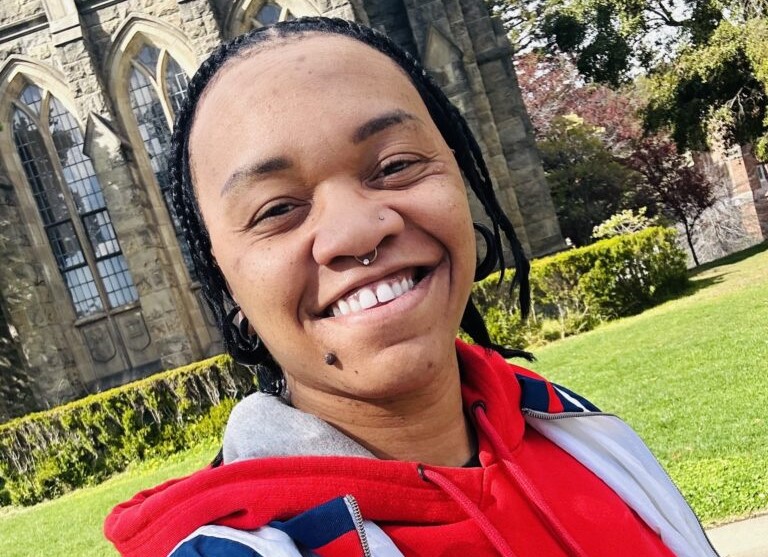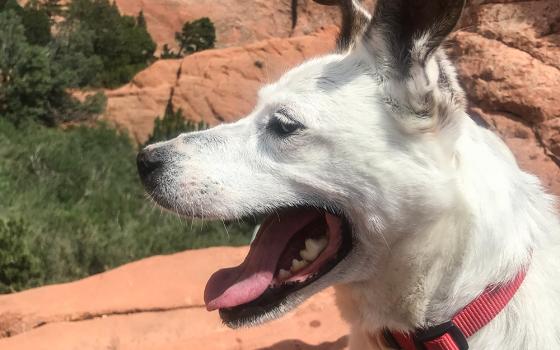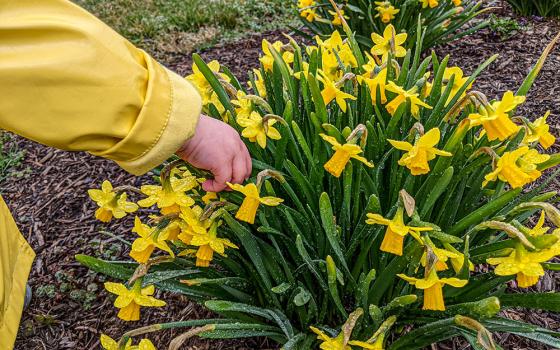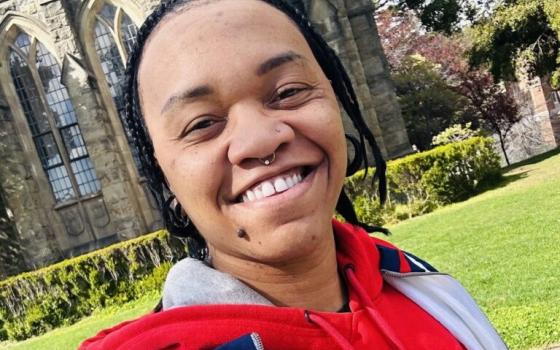
Jessie Ratcliff on the campus of Pacific School of Religion (Courtesy of Jessie Ratcliff)
Growing up as a Black transgender, nonbinary kid in Oakland, I navigated the challenges of a city known for its resilience and toughness. Despite the urban landscape surrounding me, I found solace and connection to nature through my involvement in environmentalism. In high school, I seized the opportunity to engage in trail restoration projects, which provided transformative experiences that shaped my perspective on the world.
One standout moment was when I embarked on a six-week journey to Maui to participate in building stairs within an extinct volcano. This experience was nothing short of life-changing. It allowed me to immerse myself in the natural beauty of the Hawaiian landscape while actively contributing to environmental conservation efforts. Through trail restoration work, I not only developed practical skills but also cultivated a deep appreciation for the interconnectedness between humans and the environment. It was during these formative experiences that I discovered my passion for environmental activism and the profound impact it can have on both individuals and ecosystems alike.
As a minister in training, I bring a unique perspective to my environmentalism deeply rooted in my spirituality and identity as a person of color. For me, environmentalism is not just about preserving the planet; it is a sacred duty entrusted to us by a higher power, whom I understand as God. I believe that caring for the Earth is an expression of reverence for the divine.
As a person of color, I recognize the interconnectedness between environmental justice and social justice, understanding that marginalized communities disproportionately bear the brunt of environmental degradation.
While in recent years, discussions surrounding environmentalism have expanded beyond traditional narratives to encompass more diverse perspectives and experiences, the intersectionality of social identities, particularly within marginalized communities, is still often overlooked. Among these communities, transgender people of color stand at a unique crossroads, facing intersecting forms of discrimination and marginalization. By acknowledging their experiences and perspectives, we can gain a more comprehensive understanding of environmental issues and work towards inclusive solutions that address the needs of all individuals and communities.
Advertisement
The lived experiences of transgender people of color are intricately entwined with systemic inequalities, societal discrimination, and environmental injustices. Consequently, these communities often bear a heavier burden in the face of climate change, pollution and ecological degradation.
Compounding these factors, the LGBTQ+ community, encompassing over 14 million individuals in the U.S. alone, faces heightened health inequalities due to discrimination in healthcare, housing, and disaster relief policies, along with homelessness and violence, which permeate their experiences. In states that lack both anti-discrimination laws and lax regulation for polluters, members of marginalized communities like trans POC are often forced to choose between unhealthy housing and homelessness.
This intersection of discrimination in healthcare, housing, and exposure to environmental hazards underscores the urgent need for comprehensive policy changes and societal shifts to create an inclusive and equitable environment for transgender and other marginalized individuals. However, despite increased recognition of intersectionality, research often centers on the CIS heteronormative White experience, overlooking nuanced perspectives.
While large structural changes are vital, there’s much we can do in our own backyards. In the summer of 2022, during my graduate school journey at Pacific School of Religion, I explored the intersection of environmentalism and mental health as a trans youth teacher at the Abundant Beginnings summer camp in the Oakland hills. Founded by two inspiring trans people of color, the camp provided a unique space where children aged 3 to 11 embraced their trans identities and navigated various mental health diagnoses. It became evident that nature served as a healing sanctuary for these children’s well-being, fostering an unexpected connection between environmental education and mental health support.
Balancing my role as an educator guiding young minds through the wonders of Ohlone land with the challenges of providing mental health support, this experience shaped my understanding of the interconnectedness between mental health and environmentalism. Summer 2022 marked a pivotal chapter for me — intertwining my journey in both fields and igniting a commitment to inclusive environmental education and mental health advocacy.
I plan to continue my childhood legacy as a trans kid environmentalist and spread my vision with my fellow trans brothers, sisters and beyond. My mission is to teach transgender individuals about the sacredness of our environment, emphasizing that it is God's land where all are loved and accepted. I aim to foster a deep connection to nature and affirm our place within it.
In the fight for environmental justice, we must recognize that the liberation of trans people of color is inherently intertwined with protecting our planet. Our struggles are interconnected, and our collective resistance holds the power to create a more equitable and sustainable future for all.








